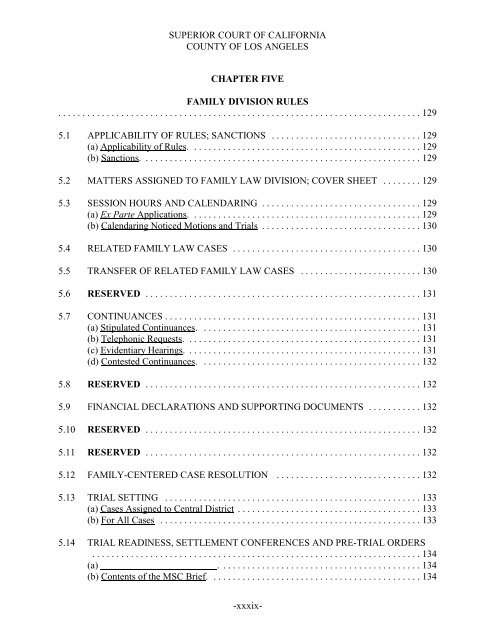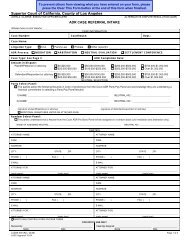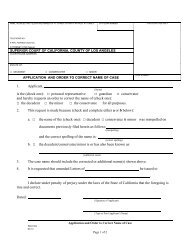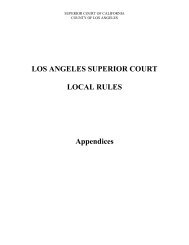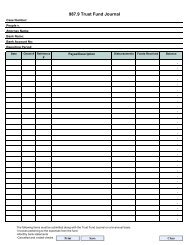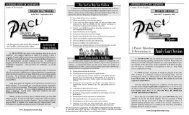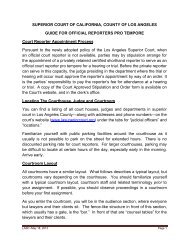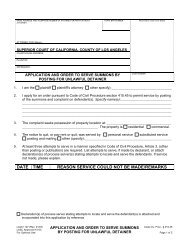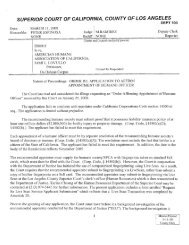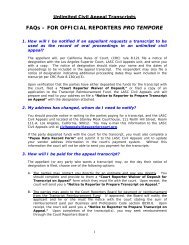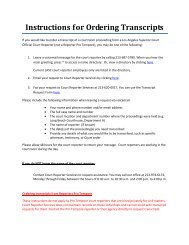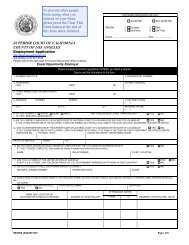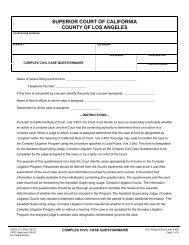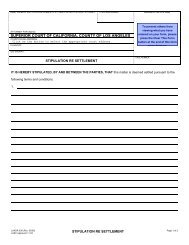Chapter five family division rules - Superior Court of California ...
Chapter five family division rules - Superior Court of California ...
Chapter five family division rules - Superior Court of California ...
- No tags were found...
Create successful ePaper yourself
Turn your PDF publications into a flip-book with our unique Google optimized e-Paper software.
SUPERIOR COURT OF CALIFORNIACOUNTY OF LOS ANGELESCHAPTER FIVEFAMILY DIVISION RULES...........................................................................1295.1 APPLICABILITY OF RULES; SANCTIONS ...............................129(a) Applicability <strong>of</strong> Rules. ...............................................129(b) Sanctions. .........................................................1295.2 MATTERS ASSIGNED TO FAMILY LAW DIVISION; COVER SHEET ........1295.3 SESSION HOURS AND CALENDARING .................................129(a) Ex Parte Applications. ...............................................129(b) Calendaring Noticed Motions and Trials .................................1305.4 RELATED FAMILY LAW CASES .......................................1305.5 TRANSFER OF RELATED FAMILY LAW CASES .........................1305.6 RESERVED .........................................................1315.7 CONTINUANCES .....................................................131(a) Stipulated Continuances. .............................................131(b) Telephonic Requests. ................................................131(c) Evidentiary Hearings. ................................................131(d) Contested Continuances. .............................................1325.8 RESERVED .........................................................1325.9 FINANCIAL DECLARATIONS AND SUPPORTING DOCUMENTS ...........1325.10 RESERVED .........................................................1325.11 RESERVED .........................................................1325.12 FAMILY-CENTERED CASE RESOLUTION ..............................1325.13 TRIAL SETTING .....................................................133(a) Cases Assigned to Central District ......................................133(b) For All Cases ......................................................1335.14 TRIAL READINESS, SETTLEMENT CONFERENCES AND PRE-TRIAL ORDERS....................................................................134(a) . .........................................134(b) Contents <strong>of</strong> the MSC Brief. ...........................................134-xxxix-
SUPERIOR COURT OF CALIFORNIACOUNTY OF LOS ANGELES(c) Sanctions for Failure to Comply with Trial Readiness Requirements Ordered by the<strong>Court</strong>. .........................................................1355.15 TRIAL ..............................................................135(a) Continuance. .......................................................135(b) Pre-trial Filings. ....................................................135(c) Trial Procedure. ....................................................1355.16 JUDGMENT PROCEDURE .............................................135(a) Bifurcated Status Only Judgments. ......................................136(b) Stipulated Judgments on Further Reserved Issues. .........................1365.17 DEFAULT OR UNCONTESTED JUDGMENT BY AFFIDAVIT ...............1365.18 ALTERNATIVE DISPUTE RESOLUTION (“ADR”) OF NON-CUSTODY DISPUTES....................................................................137(a) Arbitration and Mediation. ............................................137(b) Mediator Qualifications. ..............................................1375.19 FAMILY COURT SERVICES: MEDIATION, CUSTODY EVALUATIONS ANDPARENT EDUCATION ................................................137(a) Family <strong>Court</strong> Services Mediation. ......................................137(b) Confidentiality <strong>of</strong> Family <strong>Court</strong> Services Proceedings. ......................138(c) Adherence to Standards and Requests for Change <strong>of</strong> Family <strong>Court</strong> ServicesMediator/Evaluator. ..............................................139(d) Assessment <strong>of</strong> minor(s) seeking permission to marry. .......................1405.20 PRIVATE CHILD CUSTODY EVALUATIONS .............................140(a) Peremptory Challenge. ...............................................140(b) Withdrawal From a Case. .............................................140(c) Complaint Regarding Evaluator. .......................................140(d) Training. ..........................................................140(e) Private Evaluator List ................................................1405.21 COMPLAINTS REGARDING MINOR’S COUNSEL .........................1425.22 MINOR'S CONTRACT PROCEDURE ....................................142(a) Filing Of Petition. ...................................................142(b) Compliance With Family Code Section 6752(e). ..........................143(c) Continuing Jurisdiction. ..............................................143(d) Application For Release Of Funds. .....................................143(e) Fees. .............................................................1435.23 DUTIES OF FAMILY LAW FACILITATOR ...............................143(a) Meetings. .........................................................143-xl-
SUPERIOR COURT OF CALIFORNIACOUNTY OF LOS ANGELES(b) Stipulations. .......................................................143(c) Advice to <strong>Court</strong>. ....................................................143(d) Preparation <strong>of</strong> Order. ................................................1435.24 ACTIONS FOR PATERNITY/PARENTAGE, CHILD AND SPOUSAL SUPPORT....................................................................143(a) Central Civil West <strong>Court</strong>house. ........................................143(b) Stanley Mosk <strong>Court</strong>house (Central) and District <strong>Court</strong> Family Law Departments...............................................................144(c) Incorrect Filing: Transfer to Central Civil West. ...........................1445.25 DECLARATION/STATEMENT OF PROVIDER OF SUPERVISED VISITATION....................................................................1445.26 COLLABORATIVE LAW CASES ........................................144(a) Designation. .......................................................144(b) Contested Matters. ..................................................144(c) Initial Assignment. ..................................................145(d) Termination. .......................................................145-xli-
SUPERIOR COURT OF CALIFORNIACOUNTY OF LOS ANGELESCHAPTER FIVEFAMILY DIVISION RULES5.1 APPLICABILITY OF RULES; SANCTIONS(a) Applicability <strong>of</strong> Rules. These Rules apply in all departments <strong>of</strong> the Family Law Division.Local Rule 1.1 defines “counsel” as including self-represented litigants and attorneys. Both will beheld to the same standards <strong>of</strong> practice and procedure.(b) Sanctions. For any noncompliance with these <strong>rules</strong>, the court may set an order to showcause why sanctions or other penalties should not be imposed pursuant to Code <strong>of</strong> Civil Proceduresection 575.2.(Rule 5.1 new and effective July 1, 2011)5.2 MATTERS ASSIGNED TO FAMILY LAW DIVISION; COVER SHEETAll matters arising under the Family Code and other matters specifically assigned by these<strong>rules</strong> or order <strong>of</strong> court are assigned to the Family Law Division, except matters specifically assignedto another <strong>division</strong> by these <strong>rules</strong> or order <strong>of</strong> court.Civil harassment restraining orders are assigned to the Family Law Division. Guardianshipproceedings <strong>of</strong> minors, when related to a <strong>family</strong> law court child custody proceeding, are assignedto the Family Law Division.The first paper filed by the petitioner in an action or proceeding must be accompanied by aFamily Law Case Cover Sheet, form “FAM020.” All Family Law Division forms are located atwebsite “lasuperiorcourt.org/<strong>family</strong>law”.(Rule 5.2 [7/1/2011] amended and effective May 17, 2013)5.3 SESSION HOURS AND CALENDARING(a) Ex Parte Application. An ex parte application and order, including notice there<strong>of</strong>, mustcomply with <strong>California</strong> Rules <strong>of</strong> <strong>Court</strong>, <strong>rules</strong> 5.51-5.169, except for good cause shown or asotherwise provided by law. In a Domestic Violence Prevention Act proceeding, an application maybe made without notice pursuant to Family Code section 6300.(1) Restraining Order Ex Parte Application. An Ex Parte application for temporaryrestraining order or other order under the Domestic Violence Prevention Act (Fam. Code, § 6200et seq.) and other ex parte application for temporary restraining order in a matter specificallyassigned to the Family Law Division may be presented to the department designated for suchpurpose by the court on any court day from 8:30 a.m. until 11:30 a.m., and from 1:30 p.m. until 3:30p.m.(2) Family Law Ex Parte Application:(A) Central District: An ex parte application, brought on a ground other thanspecified in subsection (a)(1) above, may be presented on any court day only from 8:30 a.m. to 10:30a.m. in the department in which the case is assigned; or, if the case has not yet been assigned, toDepartment 2.Page 129 <strong>of</strong> 217LOCAL RULES - Effective January 1, 2014
SUPERIOR COURT OF CALIFORNIACOUNTY OF LOS ANGELES(B) District <strong>Court</strong>s: Counsel or self-represented party should contact thedepartment to which the case is assigned or, if not yet assigned, the clerk’s <strong>of</strong>fice, to determine exparte application hours.(b) Calendaring A Noticed Motion and Trial(1) Request for Order and Other Noticed Motion: A request for an order and othermotion hearings are set at 8:30 a.m. on court days not otherwise reserved for trials or otherproceedings, unless otherwise ordered by the court. At the time <strong>of</strong> presenting the request or othermotion, the filing clerk will set the matter in the assigned department only on the days availabletherefor. The moving papers must include on the face page and caption <strong>of</strong> form FL-300 the exactnature <strong>of</strong> the request for order or other non-Family Code request that is included in the request ormotion.(2) Trials:(A) In Central District Cases. Except for good cause, the department to whichthe case has been assigned will transfer the case to Department 2, or to such other location asdirected by court order, for all trial setting, trial readiness, and trial settlement related matters. Thecase will then be re-assigned for trial to any available trial department, which could include thedepartment originally assigned. The department originally assigned will continue to handle all othernon-trial and post trial proceedings.(B) Trials in Other Districts. The department to which the case is assignedwill set trial and trial-related proceedings pursuant to Local Rule 5.13 at times and days availablein that department, unless that district has adopted a master calendar reassignment rule, in whichcase the procedures for the Central District may be followed.(Rule 5.3 [7/1/2011, 1/1/2012, 5/17/2013] amended and effective January 1, 2014)5.4 RELATED FAMILY LAW CASESRelated <strong>family</strong> law cases, for the purpose <strong>of</strong> this section, are two or more cases in the FamilyLaw Division, or, where applicable, in the Probate Division, that involve the same parties, and arebased on issues governed by the Family Code or by the guardianship provisions <strong>of</strong> the Probate Code.(See Cal. Rules <strong>of</strong> <strong>Court</strong>, rule 5.440.) Related <strong>family</strong> law cases must be assigned to the samedepartment except as provided in Local Rule 5.24.Counsel in any related case must promptly serve and file a notice <strong>of</strong> related cases as requiredby <strong>California</strong> Rules <strong>of</strong> <strong>Court</strong>, <strong>rules</strong> 3.300(a) and (b).(Rule 5.4 [7/1/2011] amended and effective May 17, 2013)5.5 TRANSFER OF RELATED FAMILY LAW CASESA department to which a related <strong>family</strong> law case is assigned may transfer the case to another<strong>family</strong> law department, or may cause another related <strong>family</strong> law case to be transferred to itself.Related <strong>family</strong> law cases must be transferred, except for good cause, to the department to which thelead case is assigned, according to the following guidelines.(1) The first filed marital or Registered Domestic Partnership status case (dissolution,legal separation or nullity) must be the lead case;(2) The first filed parentage case (Uniform Parentage Act) must be the lead case whenthere is no marital status case or Registered Domestic Partnership case;Page 130 <strong>of</strong> 217LOCAL RULES - Effective January 1, 2014
SUPERIOR COURT OF CALIFORNIACOUNTY OF LOS ANGELES(3) Government parentage and support cases may be related to other <strong>family</strong> law casespursuant to Local Rule 5.24;(4) The first filed action for exclusive custody (Fam. Code, § 3120) must be the leadcase when there is no marital status or parentage case;(5) A Domestic Violence Prevention Act (“DVPA”) case must not be the lead caseover any other type <strong>of</strong> <strong>family</strong> law case with the sole exception <strong>of</strong> a case opened to receive an orderclosing a dependency case involving a minor child also identified in the DVPA case. In thatcircumstance, the two cases must be related with the DVPA case as the lead case. In the event thatthe DVPA case is dismissed, the exit order will remain in the court to which it was assigned as arelated case.(6) A case opened to receive an order closing a dependency case must not be a leadcase over any other type <strong>of</strong> <strong>family</strong> law case, and must be related to any other <strong>family</strong> law caseinvolving the same minor child.A department assigned related cases may consolidate or dismiss any <strong>of</strong> those cases aspermitted by law.(Rule 5.5 [7/1/2011] amended and effective January 1, 2012)5.6 RESERVED(Rule 5.6 [as REQUIREMENT TO MEET AND CONFER 7/1/2011, 1/1/2012]REPEALED and effective May 17, 2013)5.7 CONTINUANCES(a) Stipulated Continuances. The court will grant only one continuance based on a stipulation<strong>of</strong> counsel.(b) Telephonic Requests. A party seeking a telephonic continuance <strong>of</strong> a hearing on a requestfor orders, motion or order to show cause must comply with the following. If all parties stipulateto a continuance, counsel seeking the continuance must inform the courtroom clerk by telephone orin person as soon as possible, and in any event, no later than 3:00 p.m. two court days preceding thehearing, and must also seek a new hearing date from the clerk. The requesting counsel must statethat he or she has spoken to the opposing counsel, and that opposing counsel has agreed to thecontinuance. The requesting counsel must also advise the clerk <strong>of</strong> the number <strong>of</strong> previouscontinuances <strong>of</strong> the motion or order to show cause. No continuance will be granted on the date setfor hearing except upon appearance <strong>of</strong> counsel.The court will grant only one continuance based upon a stipulation <strong>of</strong> counsel. A requestfor a further continuance requires an appearance <strong>of</strong> counsel and a showing <strong>of</strong> good cause. Despitea stipulation <strong>of</strong> counsel, the court retains discretion to deny a requested continuance, rule on themerits <strong>of</strong> the pending proceeding, or take the matter <strong>of</strong>f calendar.(c) Evidentiary Hearings. A party seeking a telephonic continuance <strong>of</strong> an evidentiary hearingmust comply with the following. Even if all parties stipulate to a continuance, counsel seeking thecontinuance must appear in person in court to seek the continuance. A court will grant acontinuance upon a showing <strong>of</strong> good cause. Ex parte requests for continuance will be granted onlyupon a showing <strong>of</strong> true emergency circumstances. Despite the stipulation and appearance <strong>of</strong>counsel, the court retains discretion to deny a requested continuance, rule on the merits <strong>of</strong> thepending proceeding, or take the matter <strong>of</strong>f calendar.Page 131 <strong>of</strong> 217LOCAL RULES - Effective January 1, 2014
SUPERIOR COURT OF CALIFORNIACOUNTY OF LOS ANGELES(d) Contested Continuances. Absent good cause, the court will not consider a contestedapplication for a continuance, unless the requesting party tried to obtain a stipulation for acontinuance at least two days prior to the hearing.(Rule 5.7 [7/1/2011] amended and effective January 1, 2012)5.8 RESERVED(Rule 5.8 [as EVIDENTIARY OBJECTIONS 7/1/2011]REPEALED and effective May 17, 2013)5.9 FINANCIAL DECLARATIONS AND SUPPORTING DOCUMENTSThe parties must completely fill in all blanks on financial declarations (including the Incomeand Expense Declaration), as required by <strong>California</strong> Rules <strong>of</strong> <strong>Court</strong>, rule 5.92. If a party claims thata previously-filed financial declaration is “current” within the meaning <strong>of</strong> <strong>California</strong> Rules <strong>of</strong> <strong>Court</strong>,rule 5.427d, a copy must be attached to the moving or responding papers.In addition to the schedules and pay stubs required to be attached to the Income and ExpenseDeclaration, the parties must bring to the hearing copies <strong>of</strong> state and federal income tax returns(including all supporting schedules) and all loan applications (whether or not the loan was granted)for the last two years.(Rule 5.9 [7/1/2011] amended and effective May 17, 2013)5.10 RESERVED(Rule 5.10 [as EVIDENCE OF ATTORNEYS’ FEES,EXPERTS’ FEES AND COSTS 7/1/2011]REPEALED and effective May 17, 2013)5.11 RESERVED(Rule 5.11 [as PREPARATION OF ORDERS AFTER HEARING 7/1/2011, 1/1/2012]REPEALED and effective May 17, 2013)5.12 FAMILY-CENTERED CASE RESOLUTIONIt is the intent <strong>of</strong> the court to provide judicial assistance and management to the parties in<strong>family</strong> law cases in order to focus on early resolution <strong>of</strong> cases through settlement, expedite theprocessing <strong>of</strong> cases, and reduce the costs <strong>of</strong> litigation. (See Fam. Code, § 2450.)The court may hold a status conference at the first hearing calendared by a party after theresponse to the Petition is filed. At the status conference, the court may review the progress <strong>of</strong> thecase, identify unresolved issues, develop discovery plans and discuss the possibility <strong>of</strong> settlement.At the status conference, counsel must inform the court <strong>of</strong> the following matters:(1) the attendance <strong>of</strong> both parties at parents and children together (“PACT”) or completion<strong>of</strong> the on-line program available through the court’s website, and Family <strong>Court</strong> Services mediation;(2) the service by both parties <strong>of</strong> a complete Preliminary Declaration <strong>of</strong> Disclosure;(3) the filing with the court <strong>of</strong> a Declaration Regarding Service <strong>of</strong> Declaration <strong>of</strong> Disclosureand Income and Expense Declaration;(4) the readiness <strong>of</strong> the parties to participate in mediation;(5) the appropriateness <strong>of</strong> referral to arbitration;Page 132 <strong>of</strong> 217LOCAL RULES - Effective January 1, 2014
SUPERIOR COURT OF CALIFORNIACOUNTY OF LOS ANGELES(6) the willingness <strong>of</strong> the parties, to limit, schedule or expedite discovery, including thewillingness to provide the opposing party, without a discovery request: (a) the name, address, andtelephone number <strong>of</strong> each individual likely to have discoverable information that supports theparty’s disclosures, and (b) a copy <strong>of</strong>, or a description by category and location <strong>of</strong>, all documents,data compilations, and tangible things that are in the possession, custody or control <strong>of</strong> the party andthat supports the party’s disclosures;(7) the appropriateness <strong>of</strong> implementation <strong>of</strong> a <strong>family</strong> centered case resolution plan pursuantto Family Code section 2451; and(8) the willingness <strong>of</strong> the parties to stipulate to the appointment <strong>of</strong> court experts, and allocatethe expert’s expense, or to schedule a hearing for the appointment and expense allocation <strong>of</strong> courtexperts.At any status conference, the court may:(1) schedule disclosure <strong>of</strong> expert witnesses, by stipulation;(2) inquire whether issues can be narrowed by stipulation and set dates for the filing <strong>of</strong>stipulations;(3) set dates for further status conferences, as needed, and no less <strong>of</strong>ten than every sixmonths;(4) set dates for other events that must take place before the next status conference;(5) set the date for trial and/or settlement conferences; and(6) take such other action, as permitted by law, which could promote the just and efficientdisposition <strong>of</strong> the case.Appearance by counsel at any status conference, either in person or by telephone (ifapproved in advance by the court), is mandatory. Failure to appear will result in the setting <strong>of</strong> anorder to show cause why sanctions should not be imposed. No appearance is required if excused bythe court, a judgment has been filed, or the case has been dismissed.(Rule 5.12 [7/1/2011] amended and effective May 17, 2013)5.13 TRIAL SETTINGCounsel and self-represented parties may request the case be set for trial by filing the court’s“Request for Trial Setting” form number FAM 014, by motion at a status conference, or as otherwisedirected by the court.(a) Cases Assigned to Central District: For cases assigned to the Central District thedepartment to which the case is assigned, upon finding that the case is ready for trial setting, may,in its discretion, transfer the case to Department 2, or to another department, for all trial setting, trialreadiness and trial settlement related matters, from which the case will then be re-assigned for trialto any available trial department, which could include the department originally assigned. Thedepartment originally assigned will continue to handle all other non-trial and post trial proceedings.(b) For All Cases: Counsel and self-represented parties will be notified in open court or bymail <strong>of</strong> the date and time <strong>of</strong> the trial and/or pre-trial proceedings.Counsel are required to provide the court with reasonable and accurate time estimates fortrial. If the time estimate <strong>of</strong> either party is exceeded during the trial, the court may, in its discretion,deem the case submitted, declare a mistrial, or continue the matter to a new trial date.In the event that the case settles, all counsel and self-represented parties must immediatelynotify the court, so that the trial date may be vacated.Page 133 <strong>of</strong> 217LOCAL RULES - Effective January 1, 2014
SUPERIOR COURT OF CALIFORNIACOUNTY OF LOS ANGELES(Rule 5.13 [7/1/2011] amended and effective May 17, 2013)5.14 TRIAL READINESS, SETTLEMENT CONFERENCES AND PRE-TRIAL ORDERSAt a Trial Readiness Conference (“TRC”) or other trial setting proceeding the court maymake orders deemed necessary for the case to be considered ready for trial and may set the case fora Mandatory Settlement Conference (“MSC”), Arbitration, or other Alternate Dispute Resolutionproceedings.All parties and trial counsel must appear personally at the Mandatory Settlement Conference,Arbitration, or other Alternate Dispute Resolution proceeding unless otherwise ordered.The court’s role at the MSC is to assist the parties in settlement negotiations. Prior to anMSC, counsel must hold at least one face-to-face or telephonic settlement discussion, and make afull exchange <strong>of</strong> all pertinent information.(a). At a TRC or other pre-trial proceeding, the court maymake any <strong>of</strong> the following orders:(1) Not less than seven calendar days before a scheduled TRC or MSC, or other pretrialproceeding, each party must exchange on the other and lodge with Department 2, or asotherwise ordered, the following:(i) A witness list identifying all non-party, non-impeachment lay and expertwitnesses to be called at trial, together with a brief description <strong>of</strong> each witness’s testimony;(ii) An exhibit list identifying all non-impeachment exhibits to be <strong>of</strong>fered attrial to prove the case-in-chief;(iii) A current completed signed and dated Income and Expense Declaration;(iv) A completed signed and dated Property Declaration; and(v) A Jointly prepared statement <strong>of</strong> the characterization and value <strong>of</strong> eachasset, the characterization and amount <strong>of</strong> each debt, and the amount <strong>of</strong> each credit or reimbursementclaimed with references to any supporting documentation.(2) Within <strong>five</strong> days <strong>of</strong> receiving the other party’s exhibit list, a party may requestin writing that the <strong>of</strong>fering party provide a copy <strong>of</strong> any listed exhibits, which exhibits must beprovided to the requesting party prior to the next TRC, MSC, or trial date. The failure, withoutgood cause, to make a timely request for a copy <strong>of</strong> an exhibit will preclude a claim <strong>of</strong> surprise.(b) Contents <strong>of</strong> the MSC Brief. An MSC Brief, if ordered by the court, must contain thefollowing:(1) The times and dates <strong>of</strong> the MSC and the trial, set forth in the caption;. (2) All relevant statistical facts, including the date <strong>of</strong> marriage, date <strong>of</strong> separation,length <strong>of</strong> marriage (in years and months); and the number and ages <strong>of</strong> minor children;(3) A recitation <strong>of</strong> the facts <strong>of</strong> the case and its procedural history, identifying allprevious orders bearing on any matter in dispute and followed by a brief discussion <strong>of</strong> the law onwhich a party relies as to each contested issue;(4) Each party’s specific proposals regarding child custody and child and/or spousalsupport, together with computer support printouts if applicable;(5) For any case in which an item <strong>of</strong> personal or real property or an interest thereinis claimed to be separate property and the other party has not stipulated thereto in open court, thedate <strong>of</strong> acquisition, the encumbrances at acquisition, the title at acquisition, current value, and theamount <strong>of</strong> present encumbrances;Page 134 <strong>of</strong> 217LOCAL RULES - Effective January 1, 2014
SUPERIOR COURT OF CALIFORNIACOUNTY OF LOS ANGELES(6) The proposed <strong>division</strong> <strong>of</strong> community assets and community debts;(7) The amount <strong>of</strong> any attorneys’ fees, experts’ fees, or costs being requested.(8) A request for attorneys’ fees, experts’ fees, or costs must comply with therequirements <strong>of</strong> <strong>California</strong> Rules <strong>of</strong> <strong>Court</strong>, rule 5.427.(c) Sanctions for Failure to Comply with Trial Readiness Requirements Ordered by the<strong>Court</strong>. The failure, without good cause, to exchange and lodge the witness list described insub<strong>division</strong> (a)(1)(i) may preclude a party from calling any witness other than the parties at trial.The failure, without good cause, to lodge the exhibit list described in sub<strong>division</strong> (a)(1)(ii), list aparticular exhibit, or provide copies <strong>of</strong> exhibits as required by sub<strong>division</strong> (a)(2), may result insanctions, including, but not limited to, exclusion <strong>of</strong> the unlisted, non-impeachment exhibits at trial.The failure, without good cause, to comply with this rule also may result in monetary sanctions,including payment to the court or <strong>of</strong> the attorney’s fees and costs incurred by the other party, and/orto the court and payment <strong>of</strong> money, including attorneys’ fees and costs, incurred by the other partyand/or taking the trial <strong>of</strong>f calendar.(Rule 5.14 [as MANDATORY SETTLEMENT CONFERENCESAND PRE-TRIAL ORDERS 7/1/2011, 7/1/2012]re-titled & amended and effective May 17, 2013)5.15 TRIAL(a) Continuance. The trial date cannot be continued by stipulation <strong>of</strong> the parties. At a hearingbefore the court, the court may, in its discretion, continue the trial date upon a showing <strong>of</strong> goodcause. (See Cal. Rules <strong>of</strong> <strong>Court</strong>, rule 3.1332.)(b) Pre-trial Filings. The court may, at its discretion, order counsel to comply with all or part<strong>of</strong> the disclosures and pleadings required for an MSC. (See Local Rule 5.14.)A party seeking attorneys’ fees, experts’ fees, or costs must comply with <strong>California</strong> Rules<strong>of</strong> <strong>Court</strong>, rule 5.427.All exhibits listed in a party’s exhibit list exchanged pursuant to the TRC, MSC, or othercourt order must be pre-marked and exchanged at least <strong>five</strong> court days prior to the initial date set fortrial. Absent a showing <strong>of</strong> good cause, exhibits not pre-marked and exchanged will not be receivedin evidence.Before trial begins, unless otherwise ordered, counsel and self-represented parties mustsubmit to the clerk all pre-marked exhibits and a second “working” copy for the court. Voluminousexhibits should be placed in a binder with appropriate tabs. (See Local Rules 3.52 and 3.53regarding marking <strong>of</strong> exhibits for trial.)(c) Trial Procedure. Counsel should read and be familiar with Local Rules 3.37-3.159regarding civil trial procedure.(Rule 5.15 [7/1/2011] amended and effective May 17, 2013)5.16 JUDGMENT PROCEDUREIn every case in which the court asks a party to prepare and file a judgment, counsel for theparty so ordered must serve the proposed judgment on opposing counsel for approval as to form andfile the approved judgment with the court. If the party ordered to prepare the judgment fails to doso, or if the opposing party files objections to the proposed judgment within ten days <strong>of</strong> service, thePage 135 <strong>of</strong> 217LOCAL RULES - Effective January 1, 2014
SUPERIOR COURT OF CALIFORNIACOUNTY OF LOS ANGELESopposing party’s counsel may prepare and submit a proposed judgment to the court with a pro<strong>of</strong> <strong>of</strong>service on the other party.At the time the court orders the judgment prepared, the court will set an order to show causere: entry <strong>of</strong> judgment. If the judgment approved as to form is received prior to this hearing, noappearance is necessary. If no judgment is received, sanctions may be imposed.(a) Bifurcated Status Only Judgments. Parties in action for dissolution may file a bifurcatedjudgment on the issue <strong>of</strong> marital status only. The box on the Judicial Council Judgment form(FL-180) must be checked which provides that jurisdiction is reserved over all other issues and allpresent orders remain in effect.A Preliminary Declaration <strong>of</strong> Disclosure with all required attachments must be served on thenonmoving party with the proposed judgment, unless it has been served previously and a pro<strong>of</strong> <strong>of</strong>service is filed with the court.(b) Stipulated Judgments on Further Reserved Issues. When all remaining issues have beenresolved, a Stipulation for Judgment or Further Judgment Upon Reserved Issues may be submittedto the court without appearance. The proposed judgment must comply with the <strong>California</strong> Rules <strong>of</strong><strong>Court</strong>. The following forms must be submitted:(1) Original and three copies <strong>of</strong> the judgment. The court will retain the original andone copy;(2) If child support has been ordered, the judgment must be accompanied by:a) A Stipulation to Establish or Modify Child Support and Order;b) If appropriate, an Order/Notice to Withhold Income for Child Support;c) If appropriate, a Stay <strong>of</strong> Service <strong>of</strong> Earnings Assignment Order;(3) An Appearance, Stipulation and Waiver, including a stipulation that the mattermay be heard by a commissioner sitting as a judge pro tempore;(4) Declaration Regarding Service <strong>of</strong> the Final Declaration <strong>of</strong> Disclosure. If theDeclaration Regarding Final Declaration <strong>of</strong> Disclosure is waived, the waiver must be a separatewaiver, not included within the judgment;(5) Original and two copies <strong>of</strong> the Notice <strong>of</strong> Entry <strong>of</strong> Judgment; and(6) Two self-addressed, stamped envelopes, addressed to each counsel.(Rule 5.16 new and effective July 1, 2011)5.17 DEFAULT OR UNCONTESTED JUDGMENT BY AFFIDAVITThe following forms must be submitted to obtain a default or uncontested judgment:(1) Declaration for Default or Uncontested Dissolution;(2) Request for Default or Appearance, Stipulation and Waiver form, whicheverapplies;(3) Declaration Regarding Service <strong>of</strong> Declaration <strong>of</strong> Disclosure (Preliminary and/orFinal, as necessary). If the Declaration Regarding Final Declaration <strong>of</strong> Disclosure is waived, thewaiver must be a separate waiver, not included within the Judgment;(4) Original and three copies <strong>of</strong> the judgment. The court will retain the original andone copy;(5) Original and two copies <strong>of</strong> the Notice <strong>of</strong> Entry <strong>of</strong> Judgment; and(6) Two self-addressed, stamped envelopes, with the court’s address as the returnaddress;Page 136 <strong>of</strong> 217LOCAL RULES - Effective January 1, 2014
SUPERIOR COURT OF CALIFORNIACOUNTY OF LOS ANGELESAs appropriate, the following forms are also required:(1) Current Income and Expense Declaration;(2) Stipulation to Establish Or Modify Child Support and Order;(3) Earnings Assignment Order; and(4) Property Declaration.All forms must be completely filled out. A party may not request orders in the judgmentwhich were not requested in the petition.Unless there is a written agreement to the contrary, the following issues will require a courthearing:(1) Request to terminate the court’s jurisdiction over spousal support in a marriage<strong>of</strong> ten years or longer;(2) Request for no visitation or for supervised visitation; and(3) Request for a specific amount <strong>of</strong> spousal support.Filing fees will not be required from a defaulting party that has signed a judgment. Thesignature <strong>of</strong> the defaulting party must be notarized.(Rule 5.17 new and effective July 1, 2011)5.18 ALTERNATIVE DISPUTE RESOLUTION (“ADR”) OF NON-CUSTODY DISPUTES(a) Arbitration and Mediation. Pursuant to Family Code section 2554, the court may orderparties to arbitration. In lieu <strong>of</strong> arbitration, the parties may elect mediation, pursuant to Code <strong>of</strong>Civil Procedure section 1141.10.(b) Mediator Qualifications. The qualifications necessary to serve on the <strong>family</strong> lawmediation panel are found in Appendix 5.A to the Local Rules.(Rule 5.18 [7/1/2011] amended and effective May 17, 2013)5.19 FAMILY COURT SERVICES: MEDIATION, CUSTODY EVALUATIONS ANDPARENT EDUCATIONFamily <strong>Court</strong> Services must provide confidential mediation <strong>of</strong> child custody and visitationdisputes, must provide a mediation orientation program as described below in sub<strong>division</strong> (a)2)(i),and will conduct or coordinate court-ordered evaluations. Family <strong>Court</strong> Services staff will aidparents making their own decisions regarding the care <strong>of</strong> their children.(a) Family <strong>Court</strong> Services Mediation.(1) This rule applies to all <strong>family</strong> law cases involving a dispute regarding childcustody and/or visitation.(2) The Family Code assigns jurisdiction over such matters disputes to theConciliation <strong>Court</strong>. Family <strong>Court</strong> Services must provide the parents in such disputes with thefollowing:(i) A mediation orientation program which includes an explanation <strong>of</strong> themediation process, educational material regarding the effects <strong>of</strong> parental separation and conflict onchildren, and information and referrals about domestic violence.(ii) Mediation session(s) focused on the resolution <strong>of</strong> the custody and/orvisitation dispute.(3) Unless otherwise specified below, parents must attend a mediation orientation anda mediation session prior to appearing at an order to show cause hearing or trial regarding thePage 137 <strong>of</strong> 217LOCAL RULES - Effective January 1, 2014
SUPERIOR COURT OF CALIFORNIACOUNTY OF LOS ANGELEScustody and/or visitation <strong>of</strong> their children, unless they resolve all issues pertaining to custody and/orvisitation prior to the date <strong>of</strong> hearing. Parents must attend the mediation orientation program once.An appointment for a mediation session will be obtained prior to obtaining an order to show causehearing date or a trial date regarding child custody and/or visitation issues.(i) Parties in cases filed under the DVPA may attend the mediation orientationprogram but are not required to do so.(ii) Failure to attend the mediation orientation program will not preclude theFamily Law Services Mediation Office from proceeding with a mediation session in a specific case.(iii) Failure to attend the mediation orientation program will not preclude acourt from making orders regarding a specific matter.(iv) This rule and a schedule for the mediation orientation program will beprovided by the clerk to the petitioner or moving party. The petitioner or moving party must servethe same, along with the Petition or order to show cause, on the responding party. The clerk will notschedule a court date for an order to show cause hearing regarding custody and/or visitation untilthe party has scheduled a mediation appointment with Family <strong>Court</strong> Services.(v) Each party will receive a certificate <strong>of</strong> completion <strong>of</strong> the mediationorientation program. It is the responsibility <strong>of</strong> each party to provide pro<strong>of</strong> <strong>of</strong> completion <strong>of</strong> themediation orientation program upon request <strong>of</strong> the court.Sanctions may be imposed by the court upon any party for failure to completethe mediation orientation program or Family <strong>Court</strong> Services mediation.(b) Confidentiality <strong>of</strong> Family <strong>Court</strong> Services Proceedings.(1) In any <strong>family</strong> law proceeding involving the custody or visitation <strong>of</strong> minorchildren, any written report or recommendation from the Child Custody Evaluation Unit <strong>of</strong> Family<strong>Court</strong> Services or from any person appointed by the court to render a report must be confidential andunavailable to any person except the court (including Juvenile Division), the Department <strong>of</strong> Childrenand Family Services, the parties, their attorneys, expert witnesses, and any person to whom the courtgrants access by written order made with prior notice to all parties. No person who has access to areport shall disclose its contents to any child who is the subject <strong>of</strong> the report.(i) Copies <strong>of</strong> the report must be furnished by Family <strong>Court</strong> Services to counselat least ten days before any hearing or other action which is the subject <strong>of</strong> the report unless otherwiseordered by the court.(ii) The name and address <strong>of</strong> any party who becomes delinquent in paymentsowed to the court for work performed by the Child Custody Evaluations Office and the amount owedmay be released by the court to a collections agency for the purpose <strong>of</strong> collecting the debt.(iii) Nothing in this rule shall prevent an evaluator from disclosing theexistence <strong>of</strong> another court case involving the children at issue or their parents, stepparents, or legalguardians for purposes <strong>of</strong> coordinating court hearings and delivery <strong>of</strong> services.(2) Except as provided here, it is the policy <strong>of</strong> the court that all Conciliation <strong>Court</strong>marriage counseling and <strong>family</strong> mediation services are confidential. Such confidentiality is essentialto the effective functioning <strong>of</strong> the Conciliation <strong>Court</strong>.(i) Family <strong>Court</strong> Services staff must not disclose information to persons otherthan participants and their counsel, or produce records in violation <strong>of</strong> this policy. No Family <strong>Court</strong>Services staffperson, party, counsel, or participant may be compelled to testify concerning anyPage 138 <strong>of</strong> 217LOCAL RULES - Effective January 1, 2014
SUPERIOR COURT OF CALIFORNIACOUNTY OF LOS ANGELESinformation acquired--including, but not limited to, communications or observations made inconnection with the provision <strong>of</strong> Conciliation <strong>Court</strong> services.(ii) ExceptionsNothing in this rule restricts any person from reporting or serving as a witnesswhere a crime has been committed, or is alleged to have been committed, in his or her presence;Nothing in this rule restricts Family <strong>Court</strong> Services staff from complying withany law requiring reporting <strong>of</strong> child abuse and the fact that such a report was made or exists shallnot be deemed confidential;Nothing in this rule restricts Family <strong>Court</strong> Services staff from complying withthe requirements <strong>of</strong> Taras<strong>of</strong>f v. The Regents <strong>of</strong> the University <strong>of</strong> <strong>California</strong> (1976) 17 Cal.3d 425;The fact that a Family <strong>Court</strong> Services mediation session took place, the timeand place <strong>of</strong> that session, and the identities <strong>of</strong> participants shall not be deemed confidential;The fact that an agreement was or was not reached and the contents <strong>of</strong> anysigned stipulation and order resulting from a Conciliation <strong>Court</strong> session shall not be deemedconfidential;Nothing in this rule prevents a Family <strong>Court</strong> Services mediator fromrecommending that a matter be referred for a child custody evaluation, or that an attorney beappointed for a child or children;Nothing in this rule prevents the Family <strong>Court</strong> Services mediator frommeeting with the judge hearing a contested custody matter in an in-chambers conference with bothattorneys and the parties when the parties themselves have both consented to such a conferencefollowing their completion <strong>of</strong> the mediation process.Nothing in this rule prevents a mediator from disclosing the existence <strong>of</strong>another court case involving the children at issue or their parents, stepparents, or legal guardians forpurposes <strong>of</strong> coordinating court hearings and delivery <strong>of</strong> services.(c) Adherence to Standards and Requests for Change <strong>of</strong> Family <strong>Court</strong> ServicesMediator/Evaluator.(1) Mediator. A request for a change <strong>of</strong> mediator must be addressed to a Supervisor,Family <strong>Court</strong> Services. If the request is not resolved to the satisfaction <strong>of</strong> the party seeking it, thatparty may bring the request to the attention <strong>of</strong> the Administrator, Family <strong>Court</strong> Services. The requestwill be granted only upon a showing <strong>of</strong> good cause.(2) Evaluator. After a stipulation has been filed appointing the court’s Child CustodyEvaluations Office and an evaluator has been assigned, each side is permitted one peremptorychallenge to the evaluator assigned within <strong>five</strong> court days <strong>of</strong> receiving the written notification <strong>of</strong> theassignment. Challenges for cause may be made at any point in the process through the Administrator<strong>of</strong> Family <strong>Court</strong> Services. An evaluator appointed to perform a Solution Focused Evaluation canonly be challenged for cause.(3) Good cause may include, but not be limited to, a showing that the mediator orevaluator is personally acquainted with a party or has a conflict <strong>of</strong> interest or appearance there<strong>of</strong>with one <strong>of</strong> the parties or attorneys, or is otherwise unable to perform his or her duties in a fair andimpartial manner.(4) Complaints. A complaint about a Family <strong>Court</strong> Services mediator or evaluatormust be addressed in writing to the Administrator, Family <strong>Court</strong> Services. A supervisor will reviewthe complaint and the case file and discuss the matter with the individual mediator or evaluator whoPage 139 <strong>of</strong> 217LOCAL RULES - Effective January 1, 2014
SUPERIOR COURT OF CALIFORNIACOUNTY OF LOS ANGELESis the subject <strong>of</strong> the complaint. A written response will be sent to the person filing the complaint.If either the complainant or the mediator or evaluator is not satisfied with the action taken inconnection with the complaint, it may be brought to the attention <strong>of</strong> the Administrator. Ifappropriate, corrective and/or disciplinary action will be taken with the individual staff personinvolved.(5) Standards <strong>of</strong> Practice It is the responsibility <strong>of</strong> the court to assure that mediatorsand evaluators adhere to the Standards <strong>of</strong> Practice as set forth in the <strong>California</strong> Rules <strong>of</strong> <strong>Court</strong>,<strong>Chapter</strong> 5. The quality <strong>of</strong> service is monitored on an on-going basis by: (1) Regular training andclinical supervision <strong>of</strong> Family <strong>Court</strong> Services clinical staff and their work; and (2) Review sheetscompleted by judicial <strong>of</strong>ficers on child custody evaluations.(d) Assessment <strong>of</strong> minor(s) seeking permission to marry.(1) Statute requires court and parental consent for a minor seeking permission tomarry.(2) A minor seeking permission to marry must file with the <strong>Court</strong> a Request <strong>of</strong> Minorto Marry (FL-910) that includes written parental consent; and a proposed Order (FL-915).(3) To assist the court in determining whether to grant the minor permission to marry,the minor and his or her prospective spouse are required to meet with a Family <strong>Court</strong> ServicesSpecialist for an assessment for consent to marry.(4) The Family <strong>Court</strong> Services Specialist must provide the court with arecommendation as to whether the application should be granted, denied, or deferred.(5) The recommendation is confidential and unavailable to anyone except the court,the parties, and their attorneys, and will be placed in a confidential envelope.(6) The court shall consider the application, recommendation, and such other mattersit deems relevant and thereafter issue an order to grant or deny the Request <strong>of</strong> Minor to Marry.(Rule 5.19 new and effective July 1, 2011)5.20 PRIVATE CHILD CUSTODY EVALUATIONS(a) Peremptory Challenge. When a private evaluator is appointed, other than by stipulation,each side will be permitted one peremptory challenge <strong>of</strong> a specific evaluator. The challenge mustbe made within ten court days <strong>of</strong> the notice <strong>of</strong> appointment.(b) Withdrawal From a Case. A private evaluator has the right to withdraw from a caseupon a showing <strong>of</strong> good cause to the trial court making the appointment.(c) Complaint Regarding Evaluator. A complaint regarding the conduct <strong>of</strong>, or procedureemployed, by a court-appointed private child custody evaluator will be handled by the judge makingthe appointment and the appropriate pr<strong>of</strong>essional licensing board. If the evaluator is listed in thecourt’s Counselor and Evaluator Directory, the judge receiving the complaint may defer action tothe Directory Administrator pursuant to sub<strong>division</strong> (e), subsection (5), <strong>of</strong> this rule.(d) Training. A person appointed as a child custody evaluator must complete a Declaration<strong>of</strong> Private Child Custody Evaluator Regarding Qualifications (Form FL-326) showing compliancewith all applicable education, training, and experience requirements and file it in the clerk’s <strong>of</strong>ficeno later than ten days after notification <strong>of</strong> an appointment and before beginning any work on a childcustody evaluation.(e) Private Evaluator ListPage 140 <strong>of</strong> 217LOCAL RULES - Effective January 1, 2014
SUPERIOR COURT OF CALIFORNIACOUNTY OF LOS ANGELES(1) In an effort to assist parties and their attorneys in locating mental healthpr<strong>of</strong>essionals who perform Child Custody Evaluations, the court has a list <strong>of</strong> mental healthpr<strong>of</strong>essionals who perform this service. The mental health pr<strong>of</strong>essionals listed are not courtemployees and are not endorsed by the court.(2) To be included in the Evaluator List, a mental health pr<strong>of</strong>essional must:a. Be licensed in the State <strong>of</strong> <strong>California</strong> in one <strong>of</strong> the following areas: LCSW,MFT, clinical psychologist, or board certified psychiatrist;b. Declare under penalty <strong>of</strong> perjury that he/she has performed <strong>five</strong> childcustody evaluations within the last three years;c. Declare under penalty <strong>of</strong> perjury that he/she has read The Standards <strong>of</strong>Practice for <strong>Court</strong> Appointed Child Custody Evaluations in the <strong>California</strong> Rules <strong>of</strong> <strong>Court</strong> and thisLocal Rule 5.21;d. Complete any training required for child custody evaluators by statute orthe <strong>California</strong> Rules <strong>of</strong> <strong>Court</strong>;e. Have malpractice insurance coverage; andf. Not use inclusion in the directory for advertising.(3) Mental health pr<strong>of</strong>essionals seeking inclusion in the list must submit the followingmaterials which will be made available to the public:a. A signed application and declaration;b. A current résumé;c. A copy <strong>of</strong> the applicable clinical license;d. Certificates <strong>of</strong> completion <strong>of</strong> 16 hours <strong>of</strong> advanced domestic violencetraining and annual updates as required by Family Code section 1816 and <strong>California</strong> Rules <strong>of</strong> <strong>Court</strong>,rule 5.230; ande. Certificates <strong>of</strong> completion <strong>of</strong> 40 hours <strong>of</strong> initial education and training andannual updates as required by <strong>California</strong> Rules <strong>of</strong> <strong>Court</strong>, rule 5.225.(4) Mental health pr<strong>of</strong>essionals included on the list must update these materials asrequested by the court.(5) Upon appointment to perform an evaluation, a mental health pr<strong>of</strong>essional mustprovide both parties with a letter describing his or her procedures, including that any written materialsubmitted to the evaluator must be sent to the opposing party and that the final date by which writtenmaterial must be submitted.(6) Any court-ordered evaluation conducted by a mental health pr<strong>of</strong>essional listedin the directory must be completed and mailed within fourteen weeks <strong>of</strong> the court’s appointment andthe evaluator’s receipt <strong>of</strong> the required deposit, unless exceptional circumstances arise. A request foran extension must be made in writing to the court that appointed the evaluator, with copies to bothparties, and the Directory Administrator. Reasons for the extension must be described in the letter,and the length <strong>of</strong> the extension requested.(7) Upon request, the mental health pr<strong>of</strong>essionals included in the directory mustdisclose in writing any significant personal or pr<strong>of</strong>essional relationship the evaluator has or has hadwith a party, attorney, or law firm in the instant case, including the number and nature <strong>of</strong> anyservices in the past 24 months in which the evaluator has been privately compensated by a party,attorney, or law firm in the instant case. The services may include, but are not limited to, servicesprovided as an expert witness, consultant, evaluator, special master, mediator, or therapist.Page 141 <strong>of</strong> 217LOCAL RULES - Effective January 1, 2014
SUPERIOR COURT OF CALIFORNIACOUNTY OF LOS ANGELES(8) Challenges, Complaints, Removal from the Directory. The court reserves theright to remove any name from the directory upon written notification to the evaluator.a. Reasons for removal may include, but are not limited to the (i) failure tomaintain a clinical license in good standing, (ii) failure to remain current on training mandated bystatute or the <strong>California</strong> Rules <strong>of</strong> <strong>Court</strong>, (iii) submission <strong>of</strong> work that does not meet the standard <strong>of</strong>practice for court-appointed evaluators, (iv) failure to submit work in a timely fashion, (v) consistentrefusal to accept court referrals, and (vi) providing false or misleading information on theapplication.b. A complaint regarding the content <strong>of</strong> the evaluation report or theconclusions reached by the evaluator must be made to the court hearing the custody matter at thetime <strong>of</strong> trial.c. A complaint about the ethical conduct <strong>of</strong> the evaluator must be made inwriting to the Directory Administrator, and may also be made to the appropriate licensing board.d. A complaint about the procedures used by an evaluator must be addressedin writing to the List Administrator.e. Complaints addressed to the Directory Administrator will be reviewed andanswered in writing. The Directory Administrator will provide a copy <strong>of</strong> the complaint to theevaluator who is the subject <strong>of</strong> the complaint.f. A serious complaint regarding the conduct <strong>of</strong> procedures used by anevaluator will be reviewed by a committee appointed by the Supervising Judge <strong>of</strong> the Family LawDepartment. The committee will consist <strong>of</strong> the Directory Administrator, a <strong>family</strong> law judge, a courtemployed evaluator, and may also include a private evaluator and any other person appointed by theFamily Law Division Supervising Judge. The committee will review the complaint with theevaluator. If the committee decides to remove the evaluator from the directory, the evaluator willbe notified <strong>of</strong> that fact in writing. The decision <strong>of</strong> the committee will be final and not subject t<strong>of</strong>urther review. In reviewing a complaint, the members <strong>of</strong> the committee are persons performingquasi-judicial functions, and presiding at quasi-judicial proceedings within the meaning <strong>of</strong> EvidenceCode section 703.5. The records and information in the possession <strong>of</strong> the committee regardingevaluators is <strong>of</strong>ficial information acquired in confidence by public employees in the course <strong>of</strong> theirduties, and not open, or <strong>of</strong>ficially disclosed to the public within the meaning <strong>of</strong> Evidence Codesection 1040, sub<strong>division</strong>s (b)(1) and (b)(2).(Rule 5.20 [7/1/2011, 5/17/2013] amended and effective January 1, 2014)5.21 COMPLAINTS REGARDING MINOR’S COUNSELComplaints regarding the conduct and procedures employed by counsel appointed for a childpursuant to Family Code section 3150 et seq. will be handled by the judicial <strong>of</strong>ficer to whom thecase is assigned. Complaints may also be made to the State Bar <strong>of</strong> <strong>California</strong>. Pursuant to noticedmotion, application, or order to show cause, the judicial <strong>of</strong>ficer must determine what action shouldbe taken, if any.(Rule 5.21 new and effective July 1, 2011)5.22 MINOR'S CONTRACT PROCEDURE(a) Filing Of Petition. A petition for the confirmation <strong>of</strong> a minor's contract under FamilyCode section 6700 et seq. must be filed in Department 2. The contract for which confirmation isPage 142 <strong>of</strong> 217LOCAL RULES - Effective January 1, 2014
SUPERIOR COURT OF CALIFORNIACOUNTY OF LOS ANGELESsought must be attached as an exhibit to the petition. The petition must be accompanied by aseparately filed proposed order.(b) Compliance With Family Code Section 6752(e). A proposed order confirming a minor’scontract must direct petitioner, through his or her counsel, to file a declaration under penalty <strong>of</strong>perjury evidencing: (1) compliance with Family Code section 6752(b), and (2) that petitionerforwarded a copy <strong>of</strong> the order to the minor’s guardian ad litem with a cover letter which includedthe language under Family Code section 6752(e).(c) Continuing Jurisdiction. Department 2 has continuing jurisdiction over the petition andany funds blocked pursuant to court order until the funds are released. A petition to amend a priororder pursuant to Family Code section 6752(b)(7), or a petition for withdrawal <strong>of</strong> funds fromblocked account pursuant to Family Code section 6752(d)(5), must be supported by adequatedeclarations setting forth the reason and necessity <strong>of</strong> the requested action.(d) Application For Release Of Funds. Applications for release <strong>of</strong> funds to the minor afterreaching majority must be accompanied by pro<strong>of</strong> that the minor has reached the age <strong>of</strong> eighteen oris emancipated.(e) Fees. The clerk will assess a fee for processing applications for release <strong>of</strong> funds fromblocked minors accounts.(Rule 5.22 [7/1/2011] amended and effective January 1, 2012)5.23 DUTIES OF FAMILY LAW FACILITATORPursuant to the provisions <strong>of</strong> Family Code section 10005(a), duties <strong>of</strong> the Family LawFacilitator shall include the following:(a) Meetings. Meeting with litigants to mediate issues <strong>of</strong> child support, spousal support, andmaintenance <strong>of</strong> health insurance, subject to Family Code section 10012. Actions in which one orboth <strong>of</strong> the parties are self-represented have priority;(b) Stipulations. Drafting stipulations to include all issues agreed to by the parties, whichmay include issues other than those specified in Family Code section 10003;(c) Advice to <strong>Court</strong>. If the parties are unable to resolve issues with the assistance <strong>of</strong> theFamily Law Facilitator, prior to or at the hearing, and at the request <strong>of</strong> the court, reviewing thepaperwork, examining documents, preparing support schedules, and advising the court whether ornot the matter is ready to proceed; and(d) Preparation <strong>of</strong> Order. Preparing formal orders consistent with the court’s announcedorder in cases where both parties are self-represented.(Rule 5.23 new and effective July 1, 2011)5.24 ACTIONS FOR PATERNITY/PARENTAGE, CHILD AND SPOUSAL SUPPORT(a) Central Civil West <strong>Court</strong>house. The following actions shall be heard at the Central CivilWest <strong>Court</strong>house:(1) Actions filed by the Child Support Services Department (“CSSD”) pursuant tothe Family Code for an order to establish paternity (parentage) and/or child support, to modify childsupport, to obtain retroactive child support; or to enforce a child, spousal or <strong>family</strong> support order;(2) Actions filed, other than by the CSSD, involving only the modification orenforcement <strong>of</strong> a child, spousal or <strong>family</strong> support order or for the determination or collection <strong>of</strong>Page 143 <strong>of</strong> 217LOCAL RULES - Effective January 1, 2014
SUPERIOR COURT OF CALIFORNIACOUNTY OF LOS ANGELESarrears in which the CSSD has made an appearance or is enforcing the child, spousal or <strong>family</strong>support order; and(3) Actions which, upon proper notice, are transferred to Central Civil West at therequest <strong>of</strong> parties with matters pending in the Central District or other district.(b) Stanley Mosk <strong>Court</strong>house (Central) and District <strong>Court</strong> Family Law Departments. Thefollowing actions shall be heard in the Central District (Stanley Mosk <strong>Court</strong>house) and in any <strong>family</strong>law court in another district:(1) Actions filed, other than by the CSSD, by any party pursuant to the Family Codeto establish paternity (parentage) or an original order for child, spousal or <strong>family</strong> support;(2) Actions filed, other than by the CSSD, by any party pursuant to the Family Codewhich involve issues in addition to child, spousal or <strong>family</strong> support, such as custody, visitation,<strong>division</strong> or control <strong>of</strong> property and personal restraining order; and(3) All other actions not specified in sub<strong>division</strong> (a) above, unless the CSSD files andserves a written request for transfer to the Central Civil West <strong>Court</strong>house at least fifteen days priorto the scheduled court date. The court before whom the action is pending shall rule on the requestfor transfer and, if granted, a new hearing date at Central Civil West <strong>Court</strong>house shall be set no laterthan fifteen days from the date <strong>of</strong> transfer.(c) Incorrect Filing: Transfer to Central Civil West. An action which should have been filedat Central Civil West, pursuant to sub<strong>division</strong> (a), and which has been incorrectly filed in anothercourthouse, must be transferred by the clerk to Central Civil West upon discovery <strong>of</strong> the error orupon written request by letter or fax from the CSSD. The clerk shall serve notice <strong>of</strong> the transfer,specifying the reason and a new hearing date at Central Civil West no later than fifteen days fromthe date <strong>of</strong> the transfer, on all parties.(Rule 5.24 new and effective July 1, 2011)5.25 DECLARATION/STATEMENT OF PROVIDER OF SUPERVISED VISITATIONPursuant to Penal Code section 11166.5(d), all providers <strong>of</strong> supervised visitation who receivepayment for their services must complete and file a declaration/statement as provided on court FormH272. The provider must attach a copy <strong>of</strong> pro<strong>of</strong> <strong>of</strong> attendance at a training program to the form.(Rule 5.25 new and effective July 1, 2011)5.26 COLLABORATIVE LAW CASES(a) Designation. A case may be designated a “Collaborative Law Case” if the parties havesigned a written Collaborative Law Agreement that provides for 1) a full exchange <strong>of</strong> information,2) the withdrawal <strong>of</strong> the party’s attorney (whether or not said attorney is <strong>of</strong> record) upon thetermination <strong>of</strong> the collaborative law process, and 3) the joint retention <strong>of</strong> any consultants needed toassist the parties in the collaborative law process, unless otherwise authorized by the writtenagreement <strong>of</strong> the parties. The words “Collaborative Law Case” shall be placed below the casenumber in the case caption on all documents filed. Attorneys representing parties to a CollaborativeLaw Case may be, but are not required to be, <strong>of</strong> record.(b) Contested Matters. As long as a case is designated a Collaborative Law Case, nocontested matters shall be filed. Collaborative Law Cases shall not be subject to Local Rule 5.12.A Collaborative Law Case filed in the Central District shall be assigned to Department 2 until itsdesignation as a Collaborative Law Case terminates.Page 144 <strong>of</strong> 217LOCAL RULES - Effective January 1, 2014
SUPERIOR COURT OF CALIFORNIACOUNTY OF LOS ANGELES(c) Initial Assignment. For purposes <strong>of</strong> Code <strong>of</strong> Civil Procedure section 170.6, a Petitionfiled in the Central District with the words “Collaborative Law Case” in the box “Petition For” isassigned to Department 2 as a Master Calendar assignment.(d) Termination. A party may terminate the designation <strong>of</strong> a case as a Collaborative LawCase without cause by serving written notice <strong>of</strong> termination on the opposing party and filing thenotice with a pro<strong>of</strong> <strong>of</strong> service. Any filing <strong>of</strong> a contested matter by either party will also terminatethe designation <strong>of</strong> Collaborative Law Case, effective on the date <strong>of</strong> filing. Upon termination <strong>of</strong> theCollaborative Law Case designation, the status <strong>of</strong> any party’s attorney as attorney <strong>of</strong> record shallterminate without further notice. An attorney <strong>of</strong> record’s motion to withdraw from a CollaborativeLaw Case does not terminate the designation <strong>of</strong> Collaborative Law Case.(Rule 5.26 new and effective July 1, 2011)Page 145 <strong>of</strong> 217LOCAL RULES - Effective January 1, 2014


